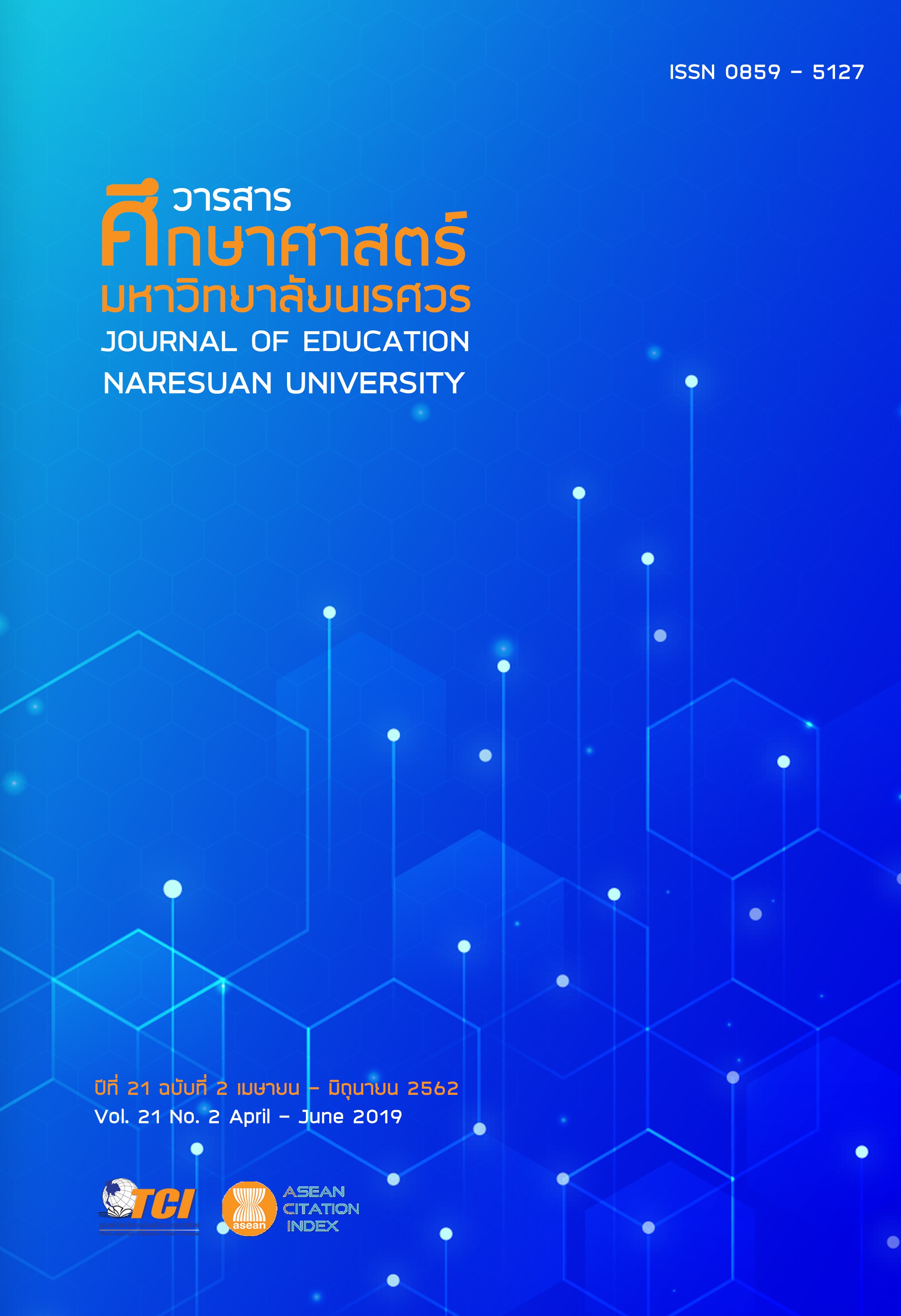การพัฒนากิจกรรมการเรียนรู้โดยใช้ปัญหาเป็นฐานเพื่อเสริมสร้างความสามารถในการแก้ปัญหาทางคณิตศาสตร์และความสามารถในการให้เหตุผลทางคณิตศาสตร์ สำหรับนักเรียนชั้นมัธยมศึกษาปีที่ 2 (THE DEVELOPMENT OF LEARNING ACTIVITIES USING PROBLEM – BASED LEARNING TO ENHANCE MATHEMATICS PROBLEM’S SOLVING ABILITY AND MATHEMATICS REASONING ABILITY FOR GRADE 8 STUDENTS)
Main Article Content
Abstract
การวิจัยครั้งนี้มีวัตถุประสงค์ คือ 1) เพื่อสร้างและหาประสิทธิภาพของกิจกรรมการเรียนรู้โดยใช้ปัญหาเป็นฐานเพื่อเสริมสร้างความสามารถในการแก้ปัญหาทางคณิตศาสตร์และความสามารถในการให้เหตุผลทางคณิตศาสตร์ ตามเกณฑ์ 75/75 2) เพื่อทดลองใช้กิจกรรมการเรียนรู้โดยใช้ปัญหาเป็นฐาน โดยเปรียบเทียบความสามารถในการแก้ปัญหาทางคณิตศาสตร์ระหว่างก่อนเรียนและหลังเรียน และเปรียบเทียบความสามารถในการให้เหตุผลทางคณิตศาสตร์ระหว่างก่อนเรียนและหลังเรียน 3) เพื่อศึกษาความพึงพอใจของนักเรียนที่มีต่อกิจกรรมการเรียนรู้โดยใช้ปัญหาเป็นฐาน วิธีดำเนินการวิจัยใช้กระบวนการของการวิจัยและพัฒนา มี 3 ขั้นตอน ดังนี้ ขั้นตอนที่ 1 การสร้างและหาประสิทธิภาพกิจกรรมการเรียนรู้ ผู้วิจัยดำเนินการสร้างกิจกรรมการเรียนรู้ 5 กิจกรรม นำไปทดลองใช้กับนักเรียนชั้นมัธยมศึกษาปีที่ 2 เพื่อหาประสิทธิภาพของกิจกรรมการเรียนรู้ตามเกณฑ์ 75/75 เครื่องมือที่ใช้ในการวิจัย ได้แก่ กิจกรรมการเรียนรู้โดยใช้ปัญหาเป็นฐาน และแบบทดสอบความสามารถในการแก้ปัญหาและความสามารถในการให้เหตุผลทางคณิตศาสตร์ สถิติที่ใช้ในการวิเคราะห์ข้อมูล คือ ค่าเฉลี่ย ส่วนเบี่ยงเบนมาตรฐาน หาประสิทธิภาพจากโดยใช้สูตร E1/E2 ขั้นตอนที่ 2 การทดลองใช้กิจกรรมการเรียนรู้โดยใช้ปัญหาเป็นฐาน กลุ่มตัวอย่าง คือ นักเรียนชั้นมัธยมศึกษาปีที่ 2 ที่กำลังศึกษาอยู่ในภาคเรียนที่ 2 ปีการศึกษา 2559 โรงเรียนบ้านหนองหลวง จังหวัดกำแพงเพชร จำนวน 16 คน สถิติที่ใช้ในการวิเคราะห์ข้อมูล คือ ค่าเฉลี่ย และทดสอบความมีนัยสำคัญทางสถิติ t – test แบบ Dependent ขั้นตอนที่ 3 การศึกษาความพึงพอใจของนักเรียนที่มีต่อกิจกรรมการเรียนรู้โดยใช้ปัญหาเป็นฐาน โดยใช้แบบประเมินความพึงพอใจ ผลการวิจัย พบว่า 1) กิจกรรมการเรียนรู้โดยใช้ปัญหาเป็นฐานเพื่อเสริมสร้างความสามารถในการแก้ปัญหาทางคณิตศาสตร์และความสามารถในการให้เหตุผลทางคณิตศาสตร์ สำหรับนักเรียนชั้นมัธยมศึกษาปีที่ 2 มีกระบวนการการเรียนรู้ 6 ขั้นตอน คือ 1) ขั้นกำหนดปัญหา 2) ขั้นทำความเข้าใจกับปัญหา 3) ขั้นดำเนินการศึกษาค้นคว้า 4) ขั้นสังเคราะห์ความรู้ 5) ขั้นสรุปและประเมินค่าของคำตอบ และ 6) ขั้นนำเสนอและประเมินผลงาน มีความเหมาะสมอยู่ในระดับมาก และมีประสิทธิภาพ เท่ากับ 77.27/76.17 ซึ่งเป็นไปตามเกณฑ์ 75/75 ที่ตั้งไว้ 2) นักเรียนมีความสามารถในการแก้ปัญหาทางคณิตศาสตร์และความสามารถในการให้เหตุผลทางคณิตศาสตร์ หลังเรียนสูงกว่าก่อนเรียนอย่างมีนัยสำคัญทางสถิติที่ระดับ .01 3) นักเรียนมีความพึงพอใจต่อกิจกรรมการเรียนรู้โดยใช้ปัญหาเป็นฐาน โดยภาพรวมอยู่ในระดับมากที่สุด
THE DEVELOPMENT OF LEARNING ACTIVITIES USING PROBLEM – BASED LEARNING TO ENHANCE MATHEMATICS PROBLEM’S SOLVING ABILITY AND MATHEMATICS REASONING ABILITY FOR GRADE 8 STUDENTS
The purposes of this research were 1) to construct and identify the efficiency of learning activities using problem–based learning to enhance Mathematics problem’s solving ability and Mathematics reasoning ability using the criteria of 75/75, 2) to implement learning activities using problem–based learning and comparing their competence before and after with learning activities using problem–based learning, and 3) to study the satisfaction of students with learning activities using problem–based learning. The research and development procedures were divided into 3 steps as follows: Step one was to construct 5 learning activities, to examine the appropriation then implemented in Mathayomsuksa 2 students to define the efficiency of 75/75. The data were analyzed by the analysis of Mean, Standard Deviation and E1/E2. Step two was to use learning activities using problem–based learning to compare the student competence before and after with learning activities using problem–based learning. The sample was 16 students in Mathayomsuksa 2 students at Bannonglaung School, Kamphaengphet Province in the second semester of the Academic Year 2016. The data were analyzed by mean and t – test dependent. Step three to study the student’s satisfaction on learning activities using problem–based learning. Using satisfaction evaluating from and analyze information by defining mean and standard deviation. Research finding were as follows: 1) the learning activities using problem–based learning have 6 steps as follow: the first step was problem definition. The second step was understand the problem. The third step was research. The fourth step was synthesis of knowledge. The fifth step was summary of answers and the sixth step was presentation and evaluation. As a result of the evaluation, the appropriateness was at the high level. The efficiency value was at 77.27/76.17, 2) the competence on mathematics problem’s solving ability and mathematics reasoning ability in the posttest was high than that of the pretest with the statistical level of .01, and 3) the students have highest level of satisfaction toward learning activities using problem–based learning.
Article Details
The owner of the article does not copy or violate any of its copyright. If any copyright infringement occurs or prosecution, in any case, the Editorial Board is not involved in all the rights to the owner of the article to be performed.
References
2. Khammani, T. (2013). Teaching science: Knowledge for effective learning process. Bangkok: Chulalongkorn University Printing. [in Thai]
3. Makanong, A. (2011). Unit 5: Psychology of learning in mathematics. In Phiphitthakun, Y., et al., Foundations and methodologies of mathematics instruction School of Educational Studies Chulalongkorn University. [in Thai]
4. Preededilok, K. (1986). Organizational management theory. Bangkok: Thana Printing. [in Thai]
5. Tanphumee, C. (2007). A study of correlation between multilevel factors with Mathematics reasoning ability of Mathayomsuksa 3 students of school under the office of the basic education commission of Udonthani I (Master thesis). Bangkok: Srinakharinwirot University. [in Thai]
6. The Institute for the Promotion of Teaching Science and Technology. (2008). Mathematical skills and processes. Bangkok: Charoen Printing 1992. [in Thai]


